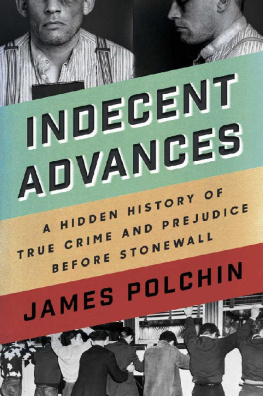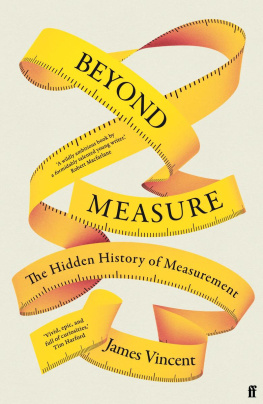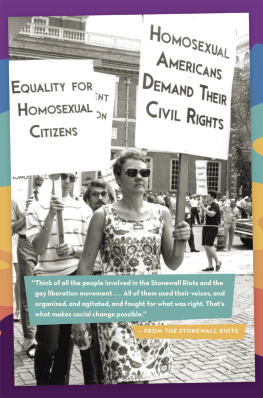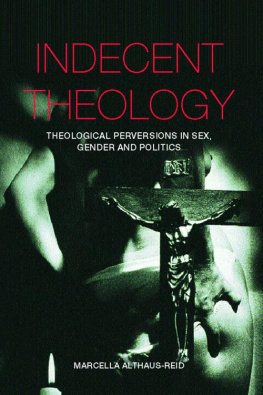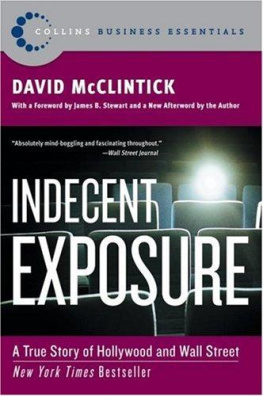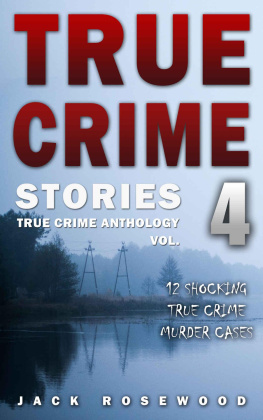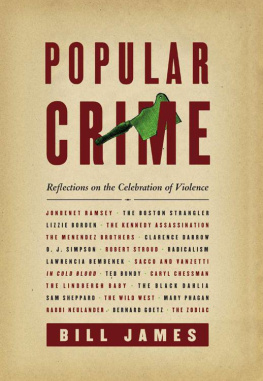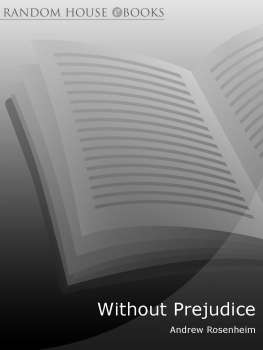James Polchin - Indecent Advances: A Hidden History of True Crime and Prejudice Before Stonewall
Here you can read online James Polchin - Indecent Advances: A Hidden History of True Crime and Prejudice Before Stonewall full text of the book (entire story) in english for free. Download pdf and epub, get meaning, cover and reviews about this ebook. year: 2019, publisher: Counterpoint, genre: Detective and thriller. Description of the work, (preface) as well as reviews are available. Best literature library LitArk.com created for fans of good reading and offers a wide selection of genres:
Romance novel
Science fiction
Adventure
Detective
Science
History
Home and family
Prose
Art
Politics
Computer
Non-fiction
Religion
Business
Children
Humor
Choose a favorite category and find really read worthwhile books. Enjoy immersion in the world of imagination, feel the emotions of the characters or learn something new for yourself, make an fascinating discovery.
- Book:Indecent Advances: A Hidden History of True Crime and Prejudice Before Stonewall
- Author:
- Publisher:Counterpoint
- Genre:
- Year:2019
- Rating:3 / 5
- Favourites:Add to favourites
- Your mark:
- 60
- 1
- 2
- 3
- 4
- 5
Indecent Advances: A Hidden History of True Crime and Prejudice Before Stonewall: summary, description and annotation
We offer to read an annotation, description, summary or preface (depends on what the author of the book "Indecent Advances: A Hidden History of True Crime and Prejudice Before Stonewall" wrote himself). If you haven't found the necessary information about the book — write in the comments, we will try to find it.
James Polchin: author's other books
Who wrote Indecent Advances: A Hidden History of True Crime and Prejudice Before Stonewall? Find out the surname, the name of the author of the book and a list of all author's works by series.
Indecent Advances: A Hidden History of True Crime and Prejudice Before Stonewall — read online for free the complete book (whole text) full work
Below is the text of the book, divided by pages. System saving the place of the last page read, allows you to conveniently read the book "Indecent Advances: A Hidden History of True Crime and Prejudice Before Stonewall" online for free, without having to search again every time where you left off. Put a bookmark, and you can go to the page where you finished reading at any time.
Font size:
Interval:
Bookmark:
Indecent Advances
INDECENT ADVANCES
A Hidden History of True Crime and Prejudice Before Stonewall
JAMES POLCHIN
COUNTERPOINT
Berkeley, California
Indecent Advances
Copyright 2019 by James Polchin
First hardcover edition: 2019
All rights reserved under International and Pan-American Copyright Conventions. No part of this book may be used or reproduced in any manner whatsoever without written permission from the publisher, except in the case of brief quotations embodied in critical articles and reviews.
Library of Congress Cataloging-in-Publication Data
Names: Polchin, James, author.
Title: Indecent advances : a hidden history of true crime and prejudice before Stonewall / James Polchin.
Description: First hardcover edition. | Berkeley, California : Counterpoint, 2019.
Identifiers: LCCN 2018058382 | ISBN 9781640091894
Subjects: LCSH: Crime and the pressUnited StatesHistory20th century. | GaysPress coverageUnited States. | CriminalsPress coverageUnited States.
Classification: LCC HV6168 .P65 2019 | DDC 070.4/493643dc23
LC record available at https://lccn.loc.gov/2018058382
Jacket design by Donna Cheng
Book design by Jordan Koluch
COUNTERPOINT
2560 Ninth Street, Suite 318
Berkeley, CA 94710
www.counterpointpress.com
Printed in the United States of America
Distributed by Publishers Group West
10 9 8 7 6 5 4 3 2 1
For Greg
Contents
Indecent Advances
I n January 1943, the thirty-one-year-old playwright Tennessee Williams wrote in his journal about the first time he was physically struck by another man:
Unhappily I cant go into details. It was a case of guilt and shame in which I was relatively the innocent party, since I merely offered entertainment, which was accepted with apparent gratitude until the untimely entrance of other parties. Feel a little sorrowful about it. So unnecessary. The sort of behavior pattern imposed by the conventional falsehoods... Why do they strike us? What is our offense? We offer them a truth which they cannot bear to confess except in privacy and the darka truth which is inherently as bright as the morning sun. He struck me because he did what I did and his friends discovered it. Yes, it hurtinside. I do not know if I will be able to sleep. But tomorrow I suppose the swollen face will be normal again and I will pick up the usual thread of life.
Today we might describe his companions response as homosexual panic, that dubious psychological condition that had its origins among sailors and soldiers returning from World War I. If Williamss attacker had been arrested for the assault, he might have claimed that Williams provoked the attack through a sexual solicitation; sodomy was then a felony punishable with prison sentences in every state in the country. In the press, editors would have reported that Williamss bruised and swollen face was a result of his indecent advance, a euphemistic term that resonated with sexual deviancy and violence, and would have reminded readers of the specific kinds of criminal threats queer men posed to society. While the term was used to describe all manner of violent sexual assaults, editors were reticent to offer details given the journalistic standards of the day, which allowed for such references only through suggestion and innuendo.
Like many queer men of the era, Williams risked police arrests or attacks by would-be robbers while he went in search of sexual and social encounters on the margins of the cityalong the docks, parks, and street corners where such encounters could be had. A few weeks after that initial violent incident, Williams would have another encounter that verged on the edge of violence. This time, it was not a case of homosexual panic, but rather one of intended intimidation and robbery. The man he brought back to his room began insulting and bullying Williams, threatening him with physical violence as he rummaged through his things. The experience carried on for about an hour, Williams wrote, and while he remained calm, he was fearful that his abuser would steal or destroy his manuscripts. Williams wrote: He finally despaired of finding any portable property of value and left, with the threat that any time he saw me he would kill me. I felt sick and disgusted. I think that is the end of my traffic with such characters. While this encounter lacked the physical violence of the earlier incident, it clearly had a stronger effect on Williams emotionally. The mans threats of future violence, and even murder, stiffened him to the dangers of such encounters. Williams did not report either incident to the police, for to do so in 1943 would risk his own arrest for sodomy, disorderly conduct, or some other criminal offense. The next day in his journal, he described the night as the most shocking experience Ive ever had with another human being.
Williamss two encounters, which left him with physical and emotional injuries, were fueled as much by the eras social prejudices as by a long history of criminalizing queer men, making them vulnerable targets for violence and abuse. The history of Western representation is littered with the corpses of gender and sexual deviants, writes the critic Heather Love. Queer history has often focused on narratives of progress in which sexual minorities prosper despite the social injuries done to them. This progressive and affirmative narrative has made injury and violence historical realities we often write against, through an emphasis on community building, cultural expressions, and political activism. Sexual minorities survived and flourished, the story goes, despite all they had to endure. But there is another story of queer experience, one that tries to recover encounters much deadlier than the ones Williams recorded in his journal. Modern homosexual identity is formed out of and in relation to the experience of social damage, Love argues, adding, paying attention to what was difficult in the past may tell us how far we have come, but that is not all it will tell us; it also makes visible the damage that we live with in the present.
This book offers one way into this record of such damage by recovering a lost history of queer true crime stories published in the press between World War I and the Stonewall protests of 1969. Most of these stories have never been read since their original publication; their documentation of injustices and discrimination has been buried for decades. In these stories, we encounter men found stabbed, shot, or strangled in hotel rooms, apartments, public parks, and subway bathrooms. We witness accounts of brutal violence between roommates, sailors and civilians, young men and older men, working-class men and wealthy companions. Many of the victims were married men, living their sexual lives in secret rendezvous, under false names to hide their identities. Others were clearly living as homosexual men, single or partnered, participating in the queer worlds that were emerging in many cities across the country with increasing visibility. Not surprisingly, such crime reports were mostly stories about encounters between white men. When men of color were present in the mainstream press, they were usually, if not always, the killers of the white men they met, reflecting how the crime pages embodied the broader racial segregation of the times.
In returning to these long-forgotten stories, we see how newspaper editors and writers shaped the human dramas with sensational appeal and cautionary concerns, furthering the eras focus on the salacious and entertaining elements of crime. Not only did the press educate readers about the nature of crime and violence, giving insights into police investigations and the courtroom battles, it also reflected and shaped ideas of morality and immorality, particularly as homosexuality was increasingly a subject of public concern. In an era when queers were understood as despised criminals, the press did much to fan the fears about sexual deviancy with sensational headlines, suggestive details, and shocking accounts of crime scenes. Such fears were acutely evident in numerous sex crime panics, frenzied moments where violent crimes that simmered with a sexual undertone became front-page news, pointing readers to the problems of sexual deviants and often targeting homosexuals for increased arrests, vigilante violence, and new efforts to criminalize harmless sexual behaviors. While queer true crime stories reflected and amplified social prejudices and state-sanctioned discriminations, they also show us how queer men were forced to navigate such dangers in their search for sexual adventure and social life.
Next pageFont size:
Interval:
Bookmark:
Similar books «Indecent Advances: A Hidden History of True Crime and Prejudice Before Stonewall»
Look at similar books to Indecent Advances: A Hidden History of True Crime and Prejudice Before Stonewall. We have selected literature similar in name and meaning in the hope of providing readers with more options to find new, interesting, not yet read works.
Discussion, reviews of the book Indecent Advances: A Hidden History of True Crime and Prejudice Before Stonewall and just readers' own opinions. Leave your comments, write what you think about the work, its meaning or the main characters. Specify what exactly you liked and what you didn't like, and why you think so.

